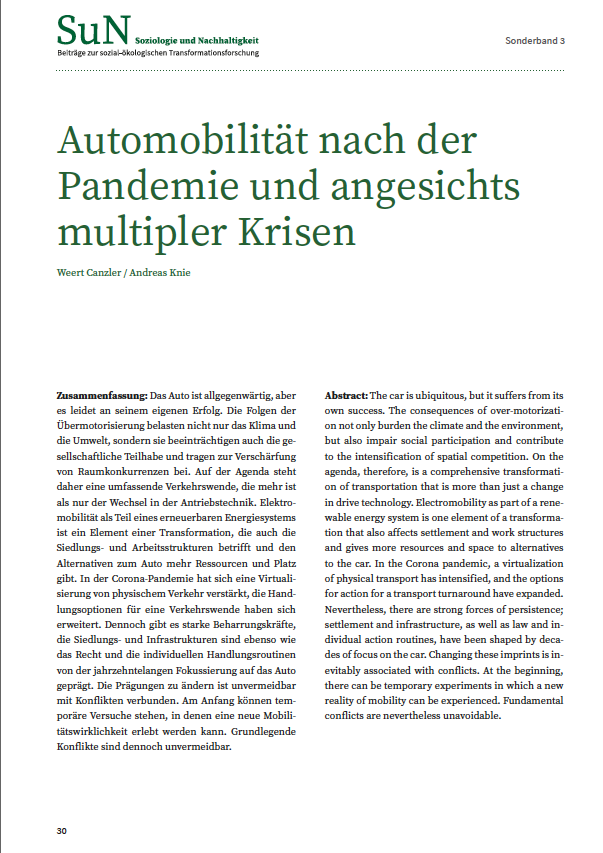Automobilität nach der Pandemie und angesichts multipler Krisen
DOI:
https://doi.org/10.17879/sun-2024-5271Schlagworte:
Verkehrswende, Klimakrise, Virtualisierung, Realexperimente, KonflikteAbstract
Das Auto ist allgegenwärtig, aber es leidet an seinem eigenen Erfolg. Die Folgen der Übermotorisierung belasten nicht nur das Klima und die Umwelt, sondern sie beeinträchtigen auch die gesellschaftliche Teilhabe und tragen zur Verschärfung von Raumkonkurrenzen bei. Auf der Agenda steht daher eine umfassende Verkehrswende, die mehr ist als nur der Wechsel in der Antriebstechnik. Elektromobilität als Teil eines erneuerbaren Energiesystems ist ein Element einer Transformation, die auch die Siedlungs- und Arbeitsstrukturen betrifft und den Alternativen zum Auto mehr Ressourcen und Platz gibt. In der Corona-Pandemie hat sich eine Virtualisierung von physischem Verkehr verstärkt, die Handlungsoptionen für eine Verkehrswende haben sich erweitert. Dennoch gibt es starke Beharrungskräfte, die Siedlungs- und Infrastrukturen sind ebenso wie das Recht und die individuellen Handlungsroutinen von der jahrzehntelangen Fokussierung auf das Auto geprägt. Die Prägungen zu ändern ist unvermeidbar mit Konflikten verbunden. Am Anfang können temporäre Versuche stehen, in denen eine neue Mobilitätswirklichkeit erlebt werden kann. Grundlegende Konflikte sind dennoch unvermeidbar.
The car is ubiquitous, but it suffers from its own success. The consequences of over-motorization not only burden the climate and the environment, but also impair social participation and contribute to the intensification of spatial competition. On the agenda, therefore, is a comprehensive transformation of transportation that is more than just a change in drive technology. Electromobility as part of a renewable energy system is one element of a transformation that also affects settlement and work structures and gives more resources and space to alternatives to the car. In the Corona pandemic, a virtualization of physical transport has intensified, and the options for action for a transport turnaround have expanded. Nevertheless, there are strong forces of persistence; settlement and infrastructure, as well as law and individual action routines, have been shaped by decades of focus on the car. Changing these imprints is inevitably associated with conflicts. At the beginning, there can be temporary experiments in which a new reality of mobility can be experienced. Fundamental conflicts are nevertheless unavoidable.
(peer reviewed)

Downloads
Veröffentlicht
Zitationsvorschlag
Ausgabe
Rubrik
Lizenz
Copyright (c) 2024 Weert Canzler, Andreas Knie

Dieses Werk steht unter der Lizenz Creative Commons Namensnennung 4.0 International.




